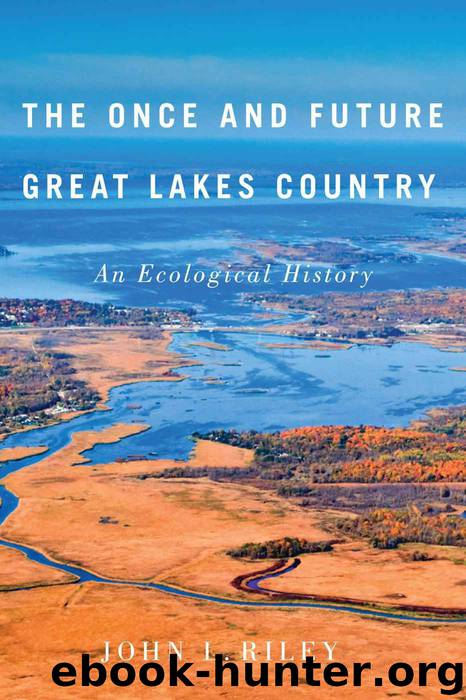The Once and Future Great Lakes Country: An Ecological History (McGill-Queen's Rural, Wildland, and Resource Studies Series) by John L. Riley

Author:John L. Riley [Riley, John L.]
Language: eng
Format: epub
ISBN: 9780773589827
Publisher: MQUP
Published: 2013-10-01T04:00:00+00:00
PART THREE
NATURE’S PROSPECT
CHAPTER NINE
Invasives: The Unintended Consequences of the Uninvited
The twentieth century unpacked some of history’s most extraordinary blessings and curses, and Nature’s prospects in Great Lakes country were at a low ebb at its dawning. With the template largely set by 1900, the pressure built inexorably, imprinting its patterns on the land and water, and the city and countryside, and squeezing out ever more of the region’s native identity. It was a profound deepening of the industrial revolution, uniquely supercharged with cheap energy. “The ecological peculiarity of the twentieth century is a matter of scale and intensity,” writes Georgetown historian John McNeill in Something New under the Sun. The pace of change waxed and waned differently in different locales, but the fundamental story was one of quantitative rather than qualitative ecological change.1
The intensification was palpable. The global human population multiplied itself four times, and city dwellers thirteen times. Energy use and the world economy increased fifteen times. Industrial output grew forty times, and carbon dioxide emissions seventeen times. It was the most prodigal of centuries, riding high on human ingenuity, especially in resisting disease, extending lifespans, and manufacturing wealth. Like none before it, the 1900s drew down the Earth’s natural capital, particularly its hydrocarbons, fresh water, timber, and ocean protein, all of them subsidies not accounted for in the spreadsheets of nations.
McNeill offers a faunal analogy. “In the twentieth century, societies often pursued the shark strategy amid a global ecology ever more unstable, and hence ever more suited for rats … The biological success of the human species is probably not at serious risk. As a species, we are much more ratlike than sharklike. The social order, on the other hand, is probably at risk.” And so too the natural order, in a new “city-state world” of displaced and reassembling peoples and biota.2
Globalism is the ascendant vision now, in materials, peoples, technologies, and communications, which further open the already porous borders of Great Lakes country. Even though the region has now achieved some quantitative easing of the worst effects of over-clearing, over-harvesting, and mismanagement, it may be too little too late. Fortunately, however, with these particular effects we have both clinical experience and the skills to diagnose and treat. We have no such experience with the effects of globalism, many of which are novel in the Earth’s history.
The impacts of the new globalism pound their way around the globe like tsunami waves, and they reach deep into Great Lakes country. Their cultural and technological implications are in the forefront of mainstream dialogue, but their ecological consequences are largely ignored. Three pillars of globalization will be the focus in this and the next two chapters: first, the unprecedented increase in biological pollution arising from global trade; second, the twinned giants of climate change and the new city-state; and, finally, the emergent forces of restraint, conservation, and restoration.
We have considered the forensics of the blunt trauma of securing, disbursing, and converting the Great Lakes country into a new Europe. Nature paid
Download
This site does not store any files on its server. We only index and link to content provided by other sites. Please contact the content providers to delete copyright contents if any and email us, we'll remove relevant links or contents immediately.
The Lonely City by Olivia Laing(4790)
Animal Frequency by Melissa Alvarez(4447)
All Creatures Great and Small by James Herriot(4297)
Walking by Henry David Thoreau(3941)
Exit West by Mohsin Hamid(3814)
Origin Story: A Big History of Everything by David Christian(3679)
COSMOS by Carl Sagan(3611)
How to Read Water: Clues and Patterns from Puddles to the Sea (Natural Navigation) by Tristan Gooley(3452)
Hedgerow by John Wright(3343)
How to Read Nature by Tristan Gooley(3316)
The Inner Life of Animals by Peter Wohlleben(3300)
How to Do Nothing by Jenny Odell(3289)
Project Animal Farm: An Accidental Journey into the Secret World of Farming and the Truth About Our Food by Sonia Faruqi(3208)
Origin Story by David Christian(3187)
Water by Ian Miller(3168)
A Forest Journey by John Perlin(3059)
The Plant Messiah by Carlos Magdalena(2916)
A Wilder Time by William E. Glassley(2849)
Forests: A Very Short Introduction by Jaboury Ghazoul(2828)
